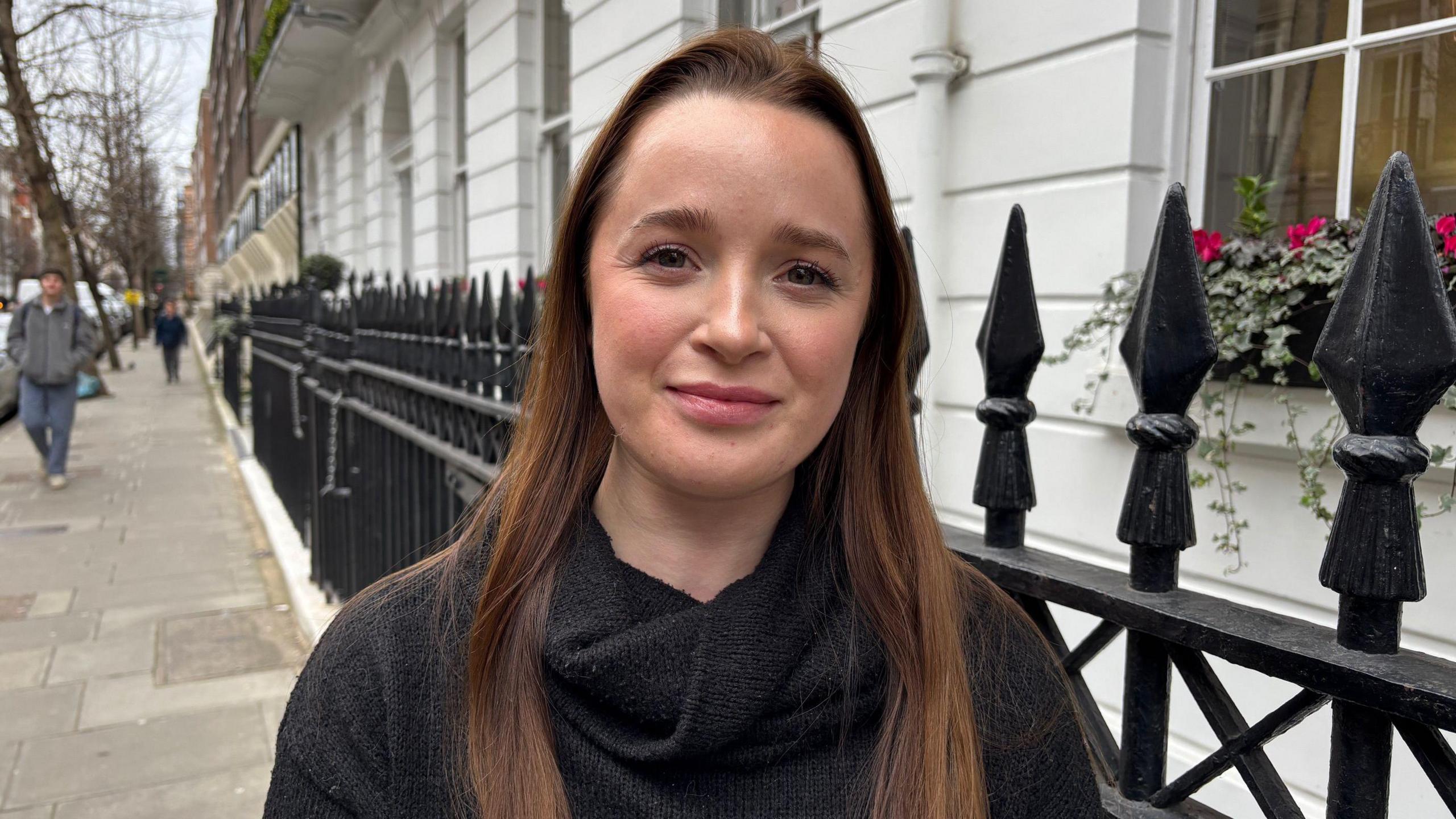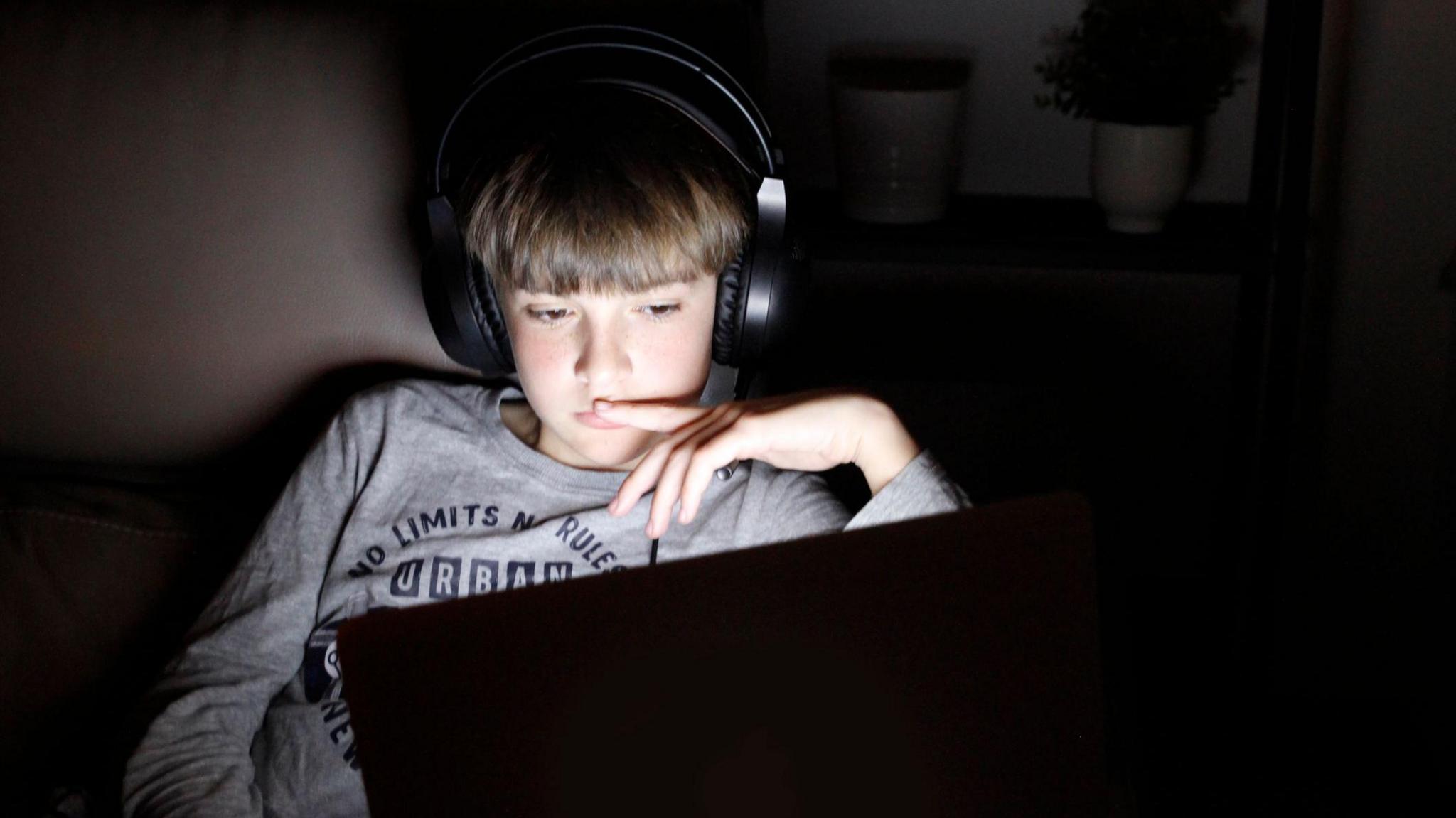Are noise-cancelling headphones to blame for young people's hearing problems?

Sophie says her anxiety peaks if she is in a loud environment and not wearing her headphones to limit the noise
- Published
Whether it's the echo of beeping tills in a supermarket or the hissing of a coffee machine in your local café, the brain is constantly working to decode hundreds of noises each day.
But, for some, those background noises can become so overwhelming that they distract them from recognising voices or alerts.
This is the reality for Sophie, a 25-year-old administration assistant from London, who is used to being told she doesn't listen, zones out, or is "a bit ditsy".
"Even though I can hear that there are noises going on, I can't listen to where the noise is coming from. I know it's the person's voice, I just can't really compute it quick enough," she said.
After a hearing test came back normal, Sophie met a private audiologist for further testing. She was eventually diagnosed with auditory processing disorder, external (APD), a neurological condition where the brain finds it difficult to understand sounds and spoken words.
Her audiologist and others in England are now calling for more research into whether the condition is linked to overuse of noise-cancelling headphones.
'Words sound like gibberish'
Having grown up on a peaceful farm in the countryside, it wasn't until a few years ago when Sophie started university in London that she noticed a change in her hearing - specifically trouble identifying where a sound was coming from.
She rarely attended her university lectures in person, instead opting to watch them online and with subtitles.
"All the words sounded like gibberish when I was in the actual lecture, and I was trying to hear," she said.
It affected her social life too and Sophie would leave bars and restaurants early because of the "overwhelming noise".

Classrooms can echo sound and be full of noises like clicking pens, typing and whispering which make listening to a teacher difficult for people with auditory processing disorder
The cause of Sophie's APD diagnosis is unknown, but her audiologist believes the overuse of noise-cancelling headphones, which Sophie wears for up to five hours a day, could have a part to play.
Other audiologists agree, saying more research is needed into the potential effects of their prolonged use.
Five NHS audiology departments have told the BBC that there has been an increase in the number of young people referred to them from GPs with hearing issues - only to find their hearing is normal when tested and it is their ability to process sound that is struggling.
APD is more common in neurodivergent people, those who have suffered from a brain injury or had a middle-ear infection as a child. However, more patients with APD are presenting outside of those categories, leaving audiologists to question if external factors, such as noise-cancelling headphones, are contributing.
Hearing vs listening
Renee Almeida, an adult audiology clinical lead at Imperial College Healthcare NHS Trust, says it is important to hear a diversity of sounds so the brain can decide what is important to focus on.
Her team has seen an increase in the amount of young people referred for hearing services in the last year. She said: "There is a difference between hearing and listening. We can see that listening skills are suffering."
Noise-cancelling headphones do have their benefits, particularly for long-term ear health where their soundproofing feature can prevent high frequency and loud noise from reaching and damaging the ear - even while listening to music.
Lisa Barber, technology editor at Which?, said the devices had "exploded in popularity" in recent years. But the level of transparency can vary from model to model.
"Some simply offer passive noise cancelling, where the acoustic seal between the headphones and your ears reduces nearby noise," she said. Others have a transparency mode that allows you to hear partial background noise.
A false reality?
But Claire Benton, vice-president of the British Academy of Audiology, suggests that by blocking everyday sounds such as cars beeping, there is a possibility the brain can "forget" to filter out the noise.
"You have almost created this false environment by wearing those headphones of only listening to what you want to listen to. You are not having to work at it," she said.
"Those more complex, high-level listening skills in your brain only really finish developing towards your late teens. So, if you have only been wearing noise-cancelling headphones and been in this false world for your late teens then you are slightly delaying your ability to process speech and noise," Benton suggests.
For those experiencing difficulties with sound processing in England, APD care in the NHS is limited.
A UK-wide survey from 2024, distributed by the BAA and ENT UK, the professional body representing ear, nose and throat surgery, found that only 4% of audiologists consider themselves to be well-informed on APD.
And, for those who are 16 years and over, the Royal National ENT and Eastman Hospital is the only NHS provider in England offering a full APD assessment and the waiting list is nine months long.
Prof Doris-Eva Bamiou, who carries out the assessments there, says this is partially down to the time it takes to diagnose APD. "It is a costly service because it is not just an audiogram, the test can take up to two hours and it requires additional assessments. In adults I also refer them for a cognitive assessment and in children I may also need to speak to an educational psychologist."
Particularly after the pandemic, behaviours and engagement with visuals and audio has changed. This comes in part due to new products and technology, as well as increased anxiety in noisy environments after the lockdown.

Great Ormond Street Hospital for Children have seen an increase in demand for assessments of children struggling to hear certain words in noisy environments
It is now common to see people walking outside wearing their noise-cancelling headphones and watching videos online with subtitles, despite perfectly hearing the sound. One YouGov survey showed that 61% of 18-24 year olds prefer to watch TV with the subtitles on.
Dr Angela Alexander, audiologist and owner of APD Support, a private organisation, is among the audiologists calling for more research into the impact of noise-cancelling headphones on auditory processing, particularly in children.
"What does the future look like if we don't investigate this link? There are a lot of well-meaning parents and teachers who think the answer to children having problems with noise is to wear ear plugs or having noise-cancelling headphones on."
Dr Amjad Mahmood, the head of audiology at Great Ormond Street Hospital supported the call for more research.
He said there had been a "significant increase in demand" for assessments at the hospital's large APD clinic for under-16s. "especially with difficulties noticed at school".
'Having a hearing dog is like winning the lottery'
- Published21 January
Could solar-powered headphones be the next must-have?
- Published17 October 2022
Study finds 18m people in the UK have hearing loss
- Published11 June 2024
Treatment for APD can make a significant positive difference, with some patients able to make a full recovery.
So-called "word in noise" training exercises on mobile apps have become a popular way of practising pulling speech from background noise. But training can vary and includes practice with auditory discrimination too, such as how to distinguish separate sounds in words like seventy and seventeen, and free and three.
Microphones and low-gain hearing aids can also be provided to help the patient in certain situations, such as a meeting or classroom work, but adults outside the education system are not entitled to these products on the NHS.
"Right now I can hear there is a fan above my head but my brain is telling me that is not something I need to worry about," says Dr Alexander, describing what is called auditory scene analysis.
"It's the way we identify threats in our environment, so it makes sense to me that there would be an increase in anxiety if a person's brain no longer has those inputs helping tell them what is a concern and what is not."
To improve this, Dr Alexander suggests reducing headphone use time and using the transparency mode which can amplify the background noise as well as wearing headphones that don't completely occlude or block the ears.
Limited research
Wayne Wilson, an associate professor in the school of health and rehabilitation sciences at The University of Queensland, says more research needs to be done on the possible link.
However, he points out that doing controlled research with so many variables could prove tricky.
"The devil is in the detail as the answer probably depends on which sounds, which scenes, which noise, which noise cancellation, what period of noise cancellation, what age of child, etc."
Sophie is set to start treatment for her APD in the next few months, and feels excited for the future.
"If me and my boyfriend go out to a bar, sometimes we will leave early because of the noise. It's nice to know maybe after this treatment, I will be able to go to busier places and handle it a bit better."